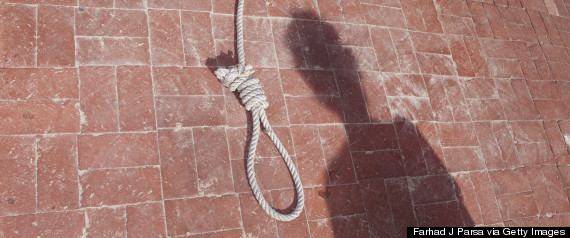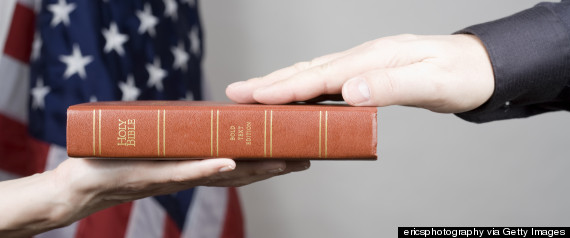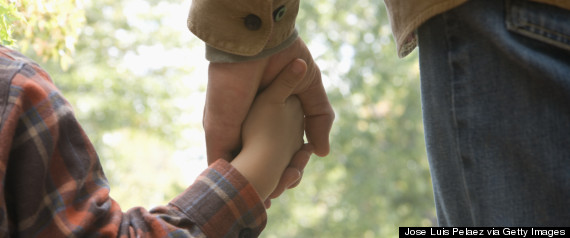When it comes to discussions on institutionalized discrimination, atheists often are left out. That may not surprise many. In a world with widespread prejudice based on gender, race and sexuality, it may be hard for people to get incensed over a story about nonbelievers fighting to remove the phrase "In God We Trust" from U.S. currency. And while these kinds of divisive challenges may be the only things that some unsympathetic people remember about atheists fighting for justice and equality, the fact is that nonbelievers in the U.S. and elsewhere in the world face systemic and substantial discrimination.
Here are 11 things atheists couldn't -- and in many cases still can't -- do because they didn't believe in God.
1. Live.

Atheists in 13 countries face execution under the law if they openly express their beliefs or reject the official state religion -- Islam in all of these cases. While this ultimate punishment may be rare, there are a number of other outrageously harsh restrictions on the basic rights of nonbelievers around the world, from revoking citizenship to denying marriage.
For more on the most severe oppression of atheists around the world, read the 2013 edition of the Freedom of Thought report, published by the International Humanist and Ethical Union.
2. Run for office.

Not believing in God is political poison, at least if you express that belief openly. While the most severe mistreatment of atheists may take place in fundamentalist nations, political discrimination is pervasive across the U.S. Despite polling that has shown nonbelievers making up an increasingly large part of the country, there isn't a single admitted atheist in Congress right now, and by most counts, there's only one in all of the state legislatures across the nation.
Furthermore, despite constitutional restrictions on "religious tests" for holding public office, six states have laws on the books barring nonbelievers. These laws aren't technically in effect, but they don't need to be. Not believing in God is such a volatile political issue that a simple meeting with people who have ties to atheist groups can expose a candidate to a brutal smear campaign.
3. Be trusted by their peers.

Discrimination against atheists doesn't appear only in the political realm, though it is quite clear there. A poll taken during the 2012 election season found that only 54 percent of Americans would vote for a "well-qualified" atheist presidential candidate. While this was the highest total since Gallup began asking the question in 1958, atheism proved the biggest negative influence on a hypothetical candidate's viability, with fewer respondents saying they would be willing to vote for an atheist than either a gay or a Muslim candidate.
Atheists have trouble being trusted even when they're not running for office. A survey taken in 2012 found that half of Americans believed atheism was "threatening" to them. Another study by the University of British Columbia and University of Oregon found that people are likely to distrust atheists as much as they do rapists.
4. Be respected by their leaders or neighbors.

During his swearing-in speech in 2011, Alabama Gov. Robert Bentley (R) threw inclusiveness out the window when he made these comments about religion:
"So anybody here today who has not accepted Jesus Christ as their savior, I'm telling you, you're not my brother and you're not my sister, and I want to be your brother," he said.
It's hard to imagine any other class of people, especially one so large -- we're not just talking nonbelievers here, but people of all non-Christian faiths -- being so casually and expressly dismissed.
Atheists are apparently so detestable that a group of military veteran nonbelievers was repeatedly heckled and berated in 2011 during a Memorial Day parade. Apparently supporting the troops comes with a big asterisk, which maybe isn't a shock, considering the military's own record of discriminating against service members who don't believe in God.
5. Have a job.

Not believing in God could make it harder to get a job, though that would of course require a would-be employer to be aware of a candidate's nontheistic beliefs. The study on distrust of atheists cited above also found that issues of faith carry over to hiring decisions. In a survey, researchers found that respondents significantly preferred religious candidates for jobs that were considered high-trust, while they marginally preferred nonbelievers for low-trust jobs, like servers.
While it may be harder in most cases to determine someone's religious beliefs than it would be their race or sexual orientation -- and therefore perhaps harder to openly discriminate against them -- this means that atheists may feel that they're better off concealing their personal views on God.
Nonbelievers also have faced discrimination after being hired. In 2010, a math teacher was fired from her position at a Catholic school after someone noticed she'd joined an atheist website from her home computer and made comments on Facebook about not believing in God. A few years prior, a government and history teacher in Texas was allegedly fired simply over the suspicion that he was an atheist. Other people have reported similar mistreatment, though the nature of their terminations wasn't confirmed.
6. Get custody of their children.

If atheists can't be trusted to be good employees, they certainly can't be trusted to be responsible parents.
Over the past few decades, there have been many documented cases of judges either denying parents custody rights because of their apparent disinterest in organized religion, or in other cases, of atheist parents being ordered to attend church so that their children can undergo "systematic spiritual training."
In 2006, an atheist father emailed The Dish columnist Andrew Sullivan to describe a custody battle that had seen his Sunday visitation rights revoked so that his son could receive "religious instruction" under his ex-wife's supervision. The case took place in Mississippi, and the father said that he feared he would only lose more ground if he challenged the religious judge's ruling.
7. Volunteer in their communities.

When the Upstate Atheists, a charity organization in Spartanburg, S.C., offered to lend a hand volunteering at a local soup kitchen last year, they were surprised to hear that the director of the facility would have rather resigned than work alongside godless members of the community. While the atheists said they had no plans to bring religion into the mix at all, the soup kitchen's director complained that they were "targeting" her organization.
The Upstate Atheists responded by setting up shop across the street from the soup kitchen and handing out 300 care packages to homeless people.
8. Advertise their beliefs, or lack thereof.

The battle over the place of God in advertising has frequently led to broader questions about discrimination against atheists. In 2011, a judge ruled that the Central Arkansas Transit Authority had violated the free speech rights of a local atheist group when it denied the group's request to launch an ad campaign on city buses. The ad organization that worked with the transit authority had regularly approved religious ads.
Elsewhere in the U.S., an attempt by a "freethought" group to purchase an ad that simply included the word "atheists" led a town to change its entire advertising policy and ban all religious-based content. And in Vancouver, British Columbia, last year, an ad company that owns most outdoor billboards in the city refused to accept material from an atheist group that was seeking to stress the power of reason and logic over prayer.
Of course, many companies have allowed atheists to purchase ad space. That controversial decision often leads to vandalism, or in some circumstances, high-profile messaging wars between nonbelievers and religious groups.
9. Participate in life without violating their beliefs.

While the Establishment Clause of the Constitution is supposed to ensure a clear separation of church and state, the two frequently intermix, much to the disapproval of nonbelievers.
This manifests itself in a variety of ways, from the inclusion of the word "God" in various mandatory pledges and on the face of U.S. currency, to compulsory religious-based sessions that atheists have been unconstitutionally forced to take part in.
While these cases are relatively common -- and it appears that a nonbeliever somewhere is always locked in a legal battle to remove religious language and imagery from the public sphere -- there are a few brazen examples that show the extremes of this issue. In Arizona last year, Republicans proposed a bill to require high school students to recite a pledge before receiving their diplomas. That oath included the words, "so help me God," and gave students no chance to opt out. While the sponsors eventually said they'd be willing to change the nature of the pledge, the bill failed.
And in South Carolina earlier this year, lawmakers again submitted a bill that would mandate daily prayer sessions in public schools. In that case, atheists or anyone objecting could leave the classroom if they pleased.
10. Create an organization.

Groups of atheists have regularly been denied the opportunity to form recognized clubs at public schools around the nation. While this difficulty is not universal, it is common. Administrators have been known to erect procedural hurdles to discourage nonbelievers from organizing, or in some cases, simply rejected their applications.
In 2011 at the University of Notre Dame, a group of "Atheist, Agnostic and Questioning Students" was denied official club status because their beliefs weren't "consistent with the University's mission." Notre Dame is a Catholic institution, but has a number of other multi-faith organizations. Apparently non-faith is not welcome.
11. Become a Boy Scout.

This one's pretty straightforward. The Boy Scouts of America still prohibits atheists from joining its ranks. Scouts must pledge to "do my duty to God and my country," and the BSA has resisted calls to remove religion from the oath. Scouts have even been asked to leave their troops after their nontheistic beliefs were discovered. In 2009, Eagle Scout Neil Polzin was fired from his job as an aquatics director at a Boy Scouts camp after his role with a secular student group was uncovered.
